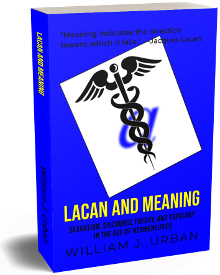LACAN AND MEANING
SEXUATION, DISCOURSE THEORY, AND TOPOLOGY IN THE AGE OF HERMENEUTICS
CHAPTER 1
PETITIONS TO MEANING
— page 16 —
language was conceived as a neutral means of transferring the meaning of a historical event from one individual to another. But in the post-critical Romantic period Humboldt conceives language in its circularity, as that which binds society while also being a product of society. The hermeneutical circle now takes a linguistic turn, weaving particular speakers into the universal tissues of language through the very same act which spins out its signifying thread. This circle extends its reach with the mid-19th century revival of philology by Boeckh. His comprehensive interpretive schema demonstrates that within the greater linguistic circle lie many smaller circles.
Yet as Nietzsche will make clear at the close of the 19th century, these Romantic expansions to the hermeneutical circle did not actually produce meanings without constraint. Given that the substance of his challenge to the hermeneutical tradition will be ignored for decades, this confirms yet one more tradition in which Nietzsche could be said to have ‘come too early.’ For his work makes it apparent that those scholars discussed up to now, from Flacius to Boeckh, so busied themselves with formulating rules and entire methodologies that they never once stopped to seriously question an operative presupposition they held, namely, the finitude of meaning produced by their hermeneutical circles. Hermeneutics prior to the 20th century could of course hold interpretation to be an endless endeavor. After all, a particular interpreter’s hermeneutical training could always be improved upon, just as the conditions of understanding could always be re-theorized towards greater inclusivity. Yet faith that a self-contained meaning existed and could be partially (if not wholly) grasped never wavered. In stark contrast, Nietzsche professed that there exists an infinity of meaning due to an infinity of interpretations derived from an infinity of perspectives. With meaning everywhere, it was at once nowhere. But far from a reason for despair, this creates an opportunity. For the ability to endure such fragmentation and disquietude is a sign of strength and a cause for celebration.
Prior hermeneutical thinkers were incapable of embracing such a conception. From Nietzsche’s perspective, their hermeneutical rules ultimately had the design to mitigate and convert the strange, unusual and questionable into things which no longer prove disturbing. He effectively viewed the entire trajectory of hermeneutical thought symptomatically, as a patchwork of strategies designed to pacify its thinkers in the face of the disturbing infinity of meaning. However, Nietzsche does not seem to fully identify with the troubling dimension he opens up in hermeneutical thought, and so fails to uncover its ontological conditions. In other words, he lacks a specific concept of this disturbance as a resistance point to the hermeneutical pursuit. That he recognizes a disturbance is commendable. Yet it seems that disturbances to the easy appropriation of meaning only register in his philosophy on the subjective level, that is, as disturbing to the subject. Left unaddressed is disturbance in its objective mode. This would otherwise permit the alternative view that the hermeneutical
« prev next »full text of Lacan and Meaning
FREE Lacanian-themed puzzles

